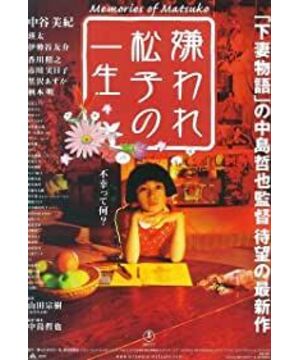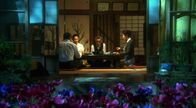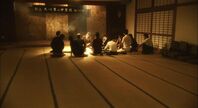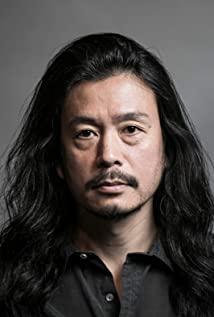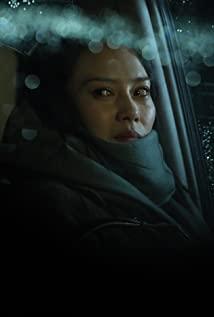This is an era of lack of dreams. The young people are numbly cheerful and happy. At this time, we saw such a film. A story full of love, hopes and dreams - "The Life of the Disgusted Matsuko", a dark fairy tale under the gorgeous picture. She used her so-called trivial and meaningless life to prove to us how to make life bloom as gorgeous as a grand event. The story of the
structural film crosses the two lines of time and space, and the reality and the memory are alternately carried out, and finally the two generations of Sheng and Songzi have completed the spiritual inheritance.
The film uses flashbacks. After the death of Songzi, Sheng was entrusted by his father to clean up his aunt's residence, leading the young man to understand the story of Songzi's past step by step. Describes the life of pine nuts.
If Sheng is compared to the interviewer, other characters act as the parties. The memories of the parties involved, along with the interviewer Sheng's arrangement of the materials, as well as his imagination and understanding of his own experience, together fill in the tragic biography of Songko's 30-year life. Matsuko's neighbors Okura, criminal police, father, AV actress Megumi Sawamura, Long Yangyi, each of the parties represents a time and space, but also their own subjective time and space. Sheng put them together and inlaid them together to form Matsuko's life. The whole picture. As Sheng contacts the characters progressively, the development of the storyline is also advanced.
The presence of nearly every man in the film is a turning point in the story. For example, the father's excessive love for his sister and the indifference to Songzi are the direct triggers for Songzi's lack of love in the future; the student Long Yang told a lie after stealing money, which made Songzi embark on a path of no return from dissatisfaction and thorns; The writer Yamegawa fell in love, was beaten, scolded and forced into prostitution, so Matsuko has since lived the life of Dazai's "rogues" and "only degenerate can maintain innocence". The life of pine nuts is divided into different stages according to different years, thus describing the life of pine nuts in more detail. The connection between the reality of the picture and the past is handled very appropriately. For example, when Long Yangyi introduced himself to Sheng, he said, "I am..." and switched to the reunion of Long and Songzi. Even though the structure of the film is complex, it is not confusing or difficult for the audience to understand.
Dreams about the theme
are usually considered to be characteristic of women, but the fairy tale ends in a hurry when the prince puts Cinderella in the glass slipper. Songzi's life is a process from the creation of dreams, from the destruction of dreams to the reconstruction of dreams. The film's recollection of Matsuko's life is actually a refutation of the opening sentence "her life is meaningless". Cowardly self and selfless love, which one should be really despised? The meaning of chasing dreams, belief and the value of life have become the true meaning of this film.
"Ah, I want to be happy, God." Under such singing, the film opens a brilliant curtain, implying that the film is about dreams and happiness. Sheng represents a new generation of young people who are lost in society, degenerate, sluggish, desperate, and rotten. Growing up in dazzling commercials and old-fashioned bubble TV series, they are constantly looking for round after round of new sensory stimulation - rock, AV, violence... They wantonly trample on their original dreams, what they see The future is just pitch black. But when Sheng learned about Aunt Matsuko's life experience and followed her, he found hope and motivation in life. He said: "To make people laugh, to encourage others, to love others, I am always scarred, lonely, and completely disregarding the fashion. This utterly stupid aunt is the God I believe in."
"The value of a person is not what you want others to do for you, but what you do for others." When Sheng's girlfriend found the value of life, she said this to Sheng. The whole film measures the value of pine nuts according to this standard. Matsuko has been hurt countless times in her life, but she continues to love with all her strength, forgive all the unforgivable people, and love them with a tolerant heart. Although she is gradually lost due to the cruelty of reality, her worldview is always pure and ideal, and she can finally find hope in despair and regain her new life.
In fact, Matsuko has no lofty dreams in her life, and there is no place where she needs to live and live bravely. But fraught love can. As Duras said: "Love makes people more calm to leave the world." Every man in Songzi is in the middle and lower classes of society, a down-and-out genius writer who has not yet achieved, or a woman who has no talent at all. The husband, or the barber shop owner who is mediocre and lacking enthusiasm, or the members of the underworld who are in the fight all day long. They also have obvious flaws in their characters, being reckless, irritable, betrayal, and ignorant, all of which ordinary women don't like to approach. However, they constitute the only and most important reason for Song Nuo to tide over the difficulties every time. It was those men who made her find a reason to breathe every time she felt her life was over. So these men are her dreams, her hopes, and everything she is. Even if she ends up being a sloppy, smelly pig-like woman, she can still be aroused by the zeal of life by the handsome teenage idol, and write passionate love letters like a girl in first love - nothing more than right. The introduction of his life, this is something that Matsuko repeats every time he is in love. Trust a person and tell him all about himself. Such a shameless life has been endowed with the skills of such a glorious lover. Her passion for life is innate. Maybe she doesn't know that such a character helps her live well and saves the immature dragon. Yoichi, and influenced the lost Sheng.
At the end of the film, all the people who appeared in Matsuko's life sang the favorite song of Matsuko, "Bend over, keep your back straight, and fly to the sky..." In fact, we all know that Matsuko used her Love has infected everyone around her, no matter whether her life is a tragedy for her, but her life is by no means meaningless or trivial. She used her experience to confirm the saying "God is love", as Duras said: "Love is the end and the creation of the world."
Born to be human, sorry. Maybe this should be Yamegawa's sigh to Matsuko, maybe it should be an apology from all the men Matsuko loved to her, maybe it should be the saddest shame to Matsuko in this scorching world. When Matsuko wrote this sentence, maybe she didn't want to use it to accuse her. This unconscious disappointment with her own emotions became more of a kind of strong sympathy. Sympathy.
But does she really need sympathy? I don't think so. She lives in a world where she loves hard because of lack, and she never regrets her life. Contrary to the peach in "The Story of My Wife", because of the richness of emotion and love, she has lived a lonely and fulfilling life. It was her imaginary world, full of love, so she hated all evil and ugliness, she kept asking why in this world, why everyone couldn't love like her, why everyone abandoned her, why ,why why. Repeated over and over again, questioned over and over again, but she still loves without hesitation. In fact, she just wants to have a home. And finally, after Matsuko's death, her dream, what she had pursued all her life, was finally realized. She stepped on the stairs of heaven step by step, and seeing her father's smile and her sister's waiting, the phrase "I'm back" was both sad and gratifying. Her perseverance is so worth it.
Regarding the audio-visual language
, many people regard this sad and heavy film as a comedy, because the film has bright colors, cheerful scenes, and is full of childish and childish fantasy and immortal good wishes. However, it is precisely because of the strong contrast between such shooting techniques and the out-of-place pathetic tone that makes the theme of this film more prominent. The effect of this is far heavier and more maddening than pure sadness.
Bright and eye-catching pictures, weakening the contrast between light and shadow and enhancing color transparency, the main colors of rose red and sky blue, the splendid flowers in the close-up, the exquisitely crafted interior decoration, Nakajima Tetsuya used this Rococo vision. The atmosphere pulls the film away from reality and builds an imaginative fairy tale kingdom. This technique is particularly prominent in The Story of the Lower Wife. In the fairy tale world, it is the tragic life of a woman who was constantly abandoned and played by men. "The Life of the Disgusted Matsuko", as Tetsuya Nakajima said, is a film that people have never seen before. The film uses a variety of narrative techniques, such as musicals, plays within plays, and random switching of space and time. , multi-angle narration of the same event, etc., through editing and animation processing with touching music to present the misfortune of the protagonist Matsuko, to express Matsuko's mood. When describing the various stages of Matsuko's life, with the change of location, the corresponding theme colors also change: Matsuko's childhood and teacher's time are described with a certain age, such as the old film-like yellowish hazy effect; bathroom girl The plot uses a lot of gold and red to match the extravagant background; the prison shots are replaced with bright blue the same color as the prisoner's uniform; the period of the fallen life is dominated by black, which also makes the brightness of the ending appear more intense.
The film begins to narrate the stories that happened in different spaces at the same time. With the music, the screen switches and pauses in an orderly manner. The characters in the film make unusual appearances through narration, and these seemingly unrelated characters are connected as the film continues. . In the scene of the play within the play, the director inserted the clip from the popular Japanese drama "Trap" to connect it with reality and reasonableness. For example, after Sheng was dumped, when paying the bill, Katahira said on the TV: "Let's do it all over again." Sheng saw his face, jumped and fell into the cliff. At this time, the background music played Songzi's music, which made people understand the intention. Sometimes the law can't save people, only the selfless love like Songzi, to be able to be reborn. Some reconciliation scenes in the film are also worth mentioning. For example, Long Yangyi finally fought with the police in the river. The scene of Songzi teaching the students to sing on the boat many years ago appeared on the camera. This echoes the time when Long Yangyi fought with the teenagers in the river and saw Songzi teaching everyone to sing on the boat from a distance. , which well reflects Long Yang's love for a pair of pine nuts, the indecent love between teachers and students.
The imagery that appears many times in the film also has deep meaning.
Flowers, every time the appearance of pine nuts must be accompanied by flowers. Bright embellishment, whether the plot is sad or happy. The life of a flower is painful and short. Women are like flowers. Or that life is like flowers. Destined to wither, why not make the bloom even more dazzling? A pine nut is a woman like a flower. Her life blooms like a flower in a prosperous world. It's blooming until the Tumi flowers. After Song Nuo was beaten by Long Yang, many scattered petals appeared in the picture. After Matsuko kills Onodera, the blue curtains make the interior seem quiet and eerie. Matsuko has her back to the camera, and the close-up view behind her is a bunch of dazzling red roses. After the pine nuts died, the yellow flowers on the quiet green grass were as bright as stars, and under the pine nuts at the bottom, there were so many bright little flowers. This flower is a symbol of the life of pine nuts.
River, at first the familiar Okura told Sheng that Songzi often sat by the river in a daze and wept, but I didn't care. When Sheng told my father that the river in front of Songzi's house was very similar to the river in his hometown, I only understood the meaning of the river in the film. That is Songzi's yearning for a warm home. Although it is incomplete and incomplete, it is the destination after all. When she lost everything, this destination is like her closing the door, and even her younger brother can't forgive herself. She has a family that she can't go back to, and her relatives that she can't recognize. The limping pine nuts were thrown at the station. She spent the rest of her life self-defeating, but she didn't know who to take revenge on. Or maybe the river looks like a pine nut. You can only keep moving forward, without looking back, you can't go back, and despair is reborn. At the end of the film, the camera was shot upstream along the river. We saw Songzi standing on the river bank in various stages. We immediately understood that Songzi was looking for a home and moving forward all his life.
Travel bag, this bag with a bell hanging throughout the film, Sheng found the photo of Songzi's coming-of-age ceremony inside the bag, and Songzi took the money from it and gave Long Yang a pad. He left Bai Ye and returned home, carried it away from Onoji Temple, went to Mitaka to end his life, carried it back from the prison to the barber shop, and left resolutely, pouring oranges into his bag in a panic to find Long Yangyi, carrying it. The Bao, who had climbed mountains and mountains, returned home for the last time, but was rejected by his younger brother thousands of miles away. I had to carry it and stand alone at the station, all alone. This bag and that string of bells may be the reflection of her feelings, and they are always the same.
Music is one of the characteristics of Tetsuya Nakajima's films. The form of singing and dancing interspersed from time to time in the film is in line with Matsuko's optimistic spirit before the age of 40. All the songs and background music in this film are very appropriate to render the character's mood. When her father took her to a fairy tale show when she was 7 years old, the fairy tale song on the stage sang: "No one doesn't like my smile". In the lively singing and dancing of "That's all lies! Lies! Lies!", Matsuko, who borrowed money, ended her last relationship with her family, and then she passed away her first cohabitation boyfriend, writer Yamegawa. As soon as the screen changed, a song and dance "Happy Wednesday" ushered in the seemingly sweet life of Matsuko as Okano's lover - what a beautiful life, today is the happy Wednesday that I have been waiting for... The happiness bubble of "Happy Wednesday" After the burst, an even bigger bubble burst - love is a bubble, love is trouble... In this song "Love is a Bubble", the constantly changing pictures tell the story of the Turkish girl career of Matsuko, who goes by the pseudonym Yukino. One morning, Matsuko, who was making breakfast, sang a beautiful song - I couldn't say the word goodbye. She really failed to say goodbye to Shimadzu, and the police suddenly showed up and took her away. Matsuko's 8-year prison life has been running through this "what's a life", Matsuko was asking herself, Shimadzu's gentle face suddenly appeared in front of her eyes, Matsuko in the mist seemed to have the courage to live, she sang - if there is love, then Can I survive... When Songzi became a rogue girl for Long Yangyi, the "Lovers" she sang in the bar aptly expressed his mood at that time - my lover, stay with me, stay in the cold My side...
and the very nice nursery rhyme "Bend Your Back and Stand Back" that runs through the whole film.
Bend over, straighten your back, and reach out to pick the stars.
Bend over, straighten your back, and fly out of Jiuxiao.
Small, shrinking, and chatting with Qingfeng.
Bend over, straighten your back, and reach out to pick the stars.
Bend over, straighten your back, and fly out of Jiuxiao.
Friends, say goodbye, see you tomorrow.
humming a song.... go home
In the end, Matsuko's soul hummed this complete song and returned home, but the journey home was too long and hard.
I do
n't know why, but I wrote so much in the first writing. In some places, I even feel that it is not detailed enough. I want to write more and add more. After all, I have to wrap up my writing. This movie contains too much true meaning of life, and it is not an exaggeration to write a book. I can always remember a scene from the movie. When Matsuko quarreled with her family and ran out by bicycle because she told her love to her sister, she was alone and lonely on the road. There should be endless darkness in front of her, but I could clearly see the bright and colorful clouds on the horizon. . I can be sure that this is a film about love, dreams and hopes.
Matsuko used her life story to tell us how to make life bloom like a flower in a prosperous world. That is love. That is the dream. That is hope.
Born to be human, sorry. A woman who lives for love and dies for love.
What kind of life makes people think in the last corner of their lives to leave such an apology to their loved ones, or to leave such a lament in their own life?
In our life, there are too many unfinished efforts, too many unfinished careers, too many damn unsatisfied desires, too many good things that we have worked hard but never saw... So we are born as human beings, ashamed of God Attentive care, worthy of the trust of loved ones, worthy of the most beautiful dream I have ever had, and worthy of the bloody youth that has passed away.
However, pine nuts are worthy of everything.
The most important thing is that we talk to her. I am sorry.
Thank you for teaching us how to make life bloom like a flourishing flower.
Life is as gorgeous as summer flowers, and death is as peaceful as autumn leaves.
View more about Kiraware Matsuko no isshô reviews


